Management Systems
Guide on Custom CRM System Development
April 17, 2024 • 249 Views • 21 min read
Tetiana Stoyko
CTO & Co-Founder
CRM development is at its peak now. It is hard to imagine a successful business, that doesn’t use any type of CRM: starting with third-party SaaS CRM systems and ending with custom software development.
To simplify it, Customer Relation Management systems or similar software solutions provide a range of features and benefits for their users. Nevertheless, one of the major questions on CRM development is what to choose: to build your own CRM, or integrate a ready-made customizable CRM as SaaS.
To answer this question, we have to learn the basics of CRM system development and examine some vital features and components of CRM.
What is CRM Development?
Customer Relationship Management system, or simply CRM, is a software, designed to provide businesses with solutions for automation and improvement of interaction with customers, according to principles, guidelines, and best CRM practices. The main goal of such custom CRM is to optimize and improve the customer experience and provide businesses with enhanced analytics on their target audience.
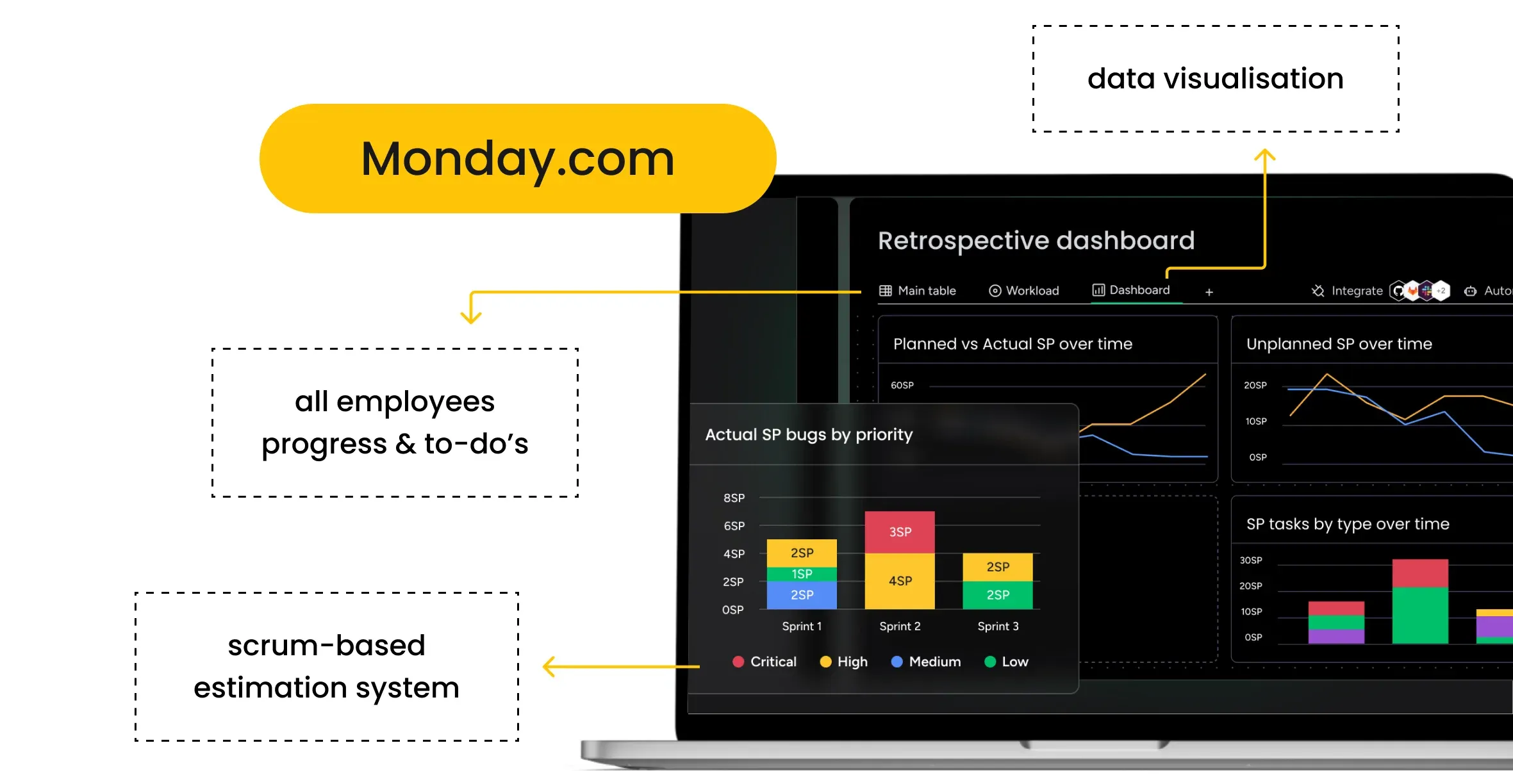
Frankly, the benefits of CRM integration directly depend on the goals, set up by the business owner. For instance, it can be used to automate client communication, provide them with fast and accurate responses, or offer business analysts detailed reports on customer behavior, related insights, statistics, and other analytical data, useful for further service improvement.
Therefore, the first step in custom CRM software development is defining the main goals you want to achieve, and choosing the most suited type of customizable CRM.
Types of CRM Development Approaches
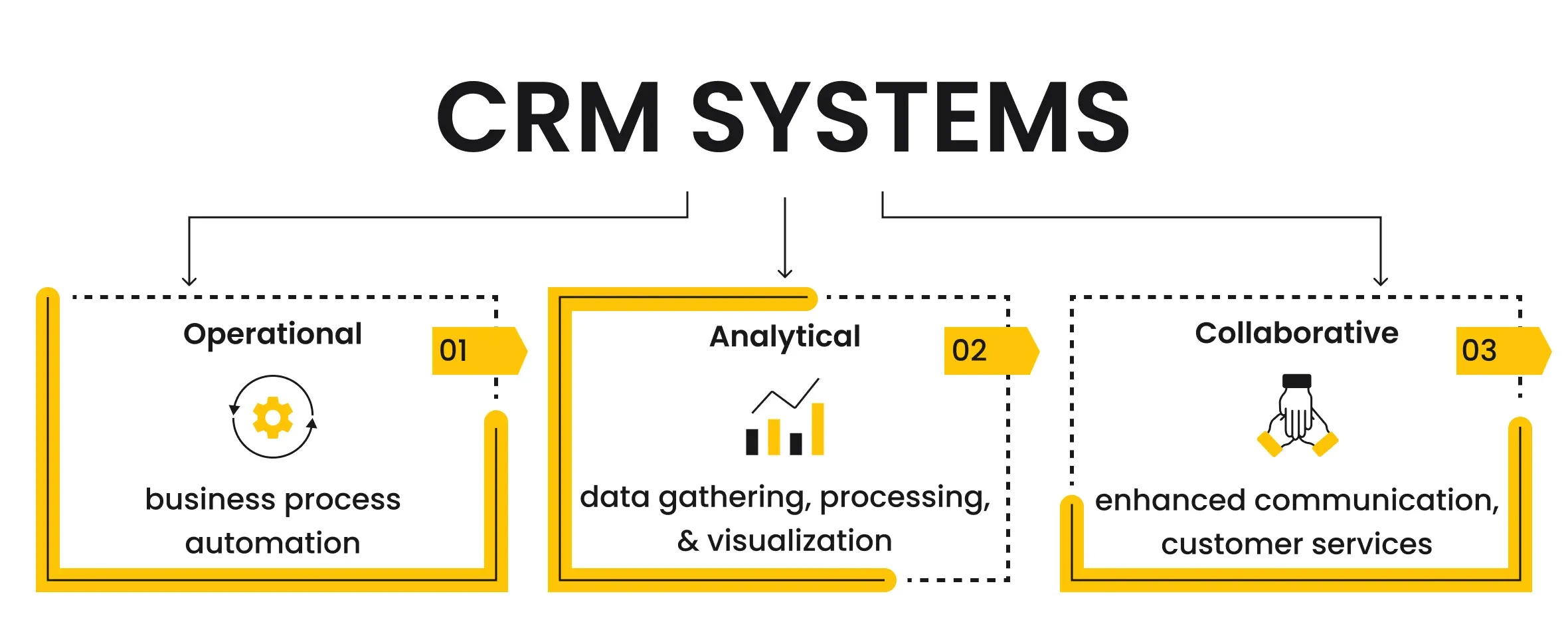
There are 3 main types of customer relationship management systems:
1. Operational CRM Systems
Operational CRM is designed to automate various business processes. For instance, it can be sales automation, improving marketing campaigns and workflows, or enhancing customer service.
To make it simple, this customer relationship management software aims at business operations automation and creating a more efficient and centralized platform, where sales, marketing, and customer service departments can access the needed data, and set up their main tasks.
2. Analytical CRM Software
This type of CRM is commonly similar to dashboard applications. In this case, the main components of CRM must empower business analysis and enable the possibility of processing big data arrays.
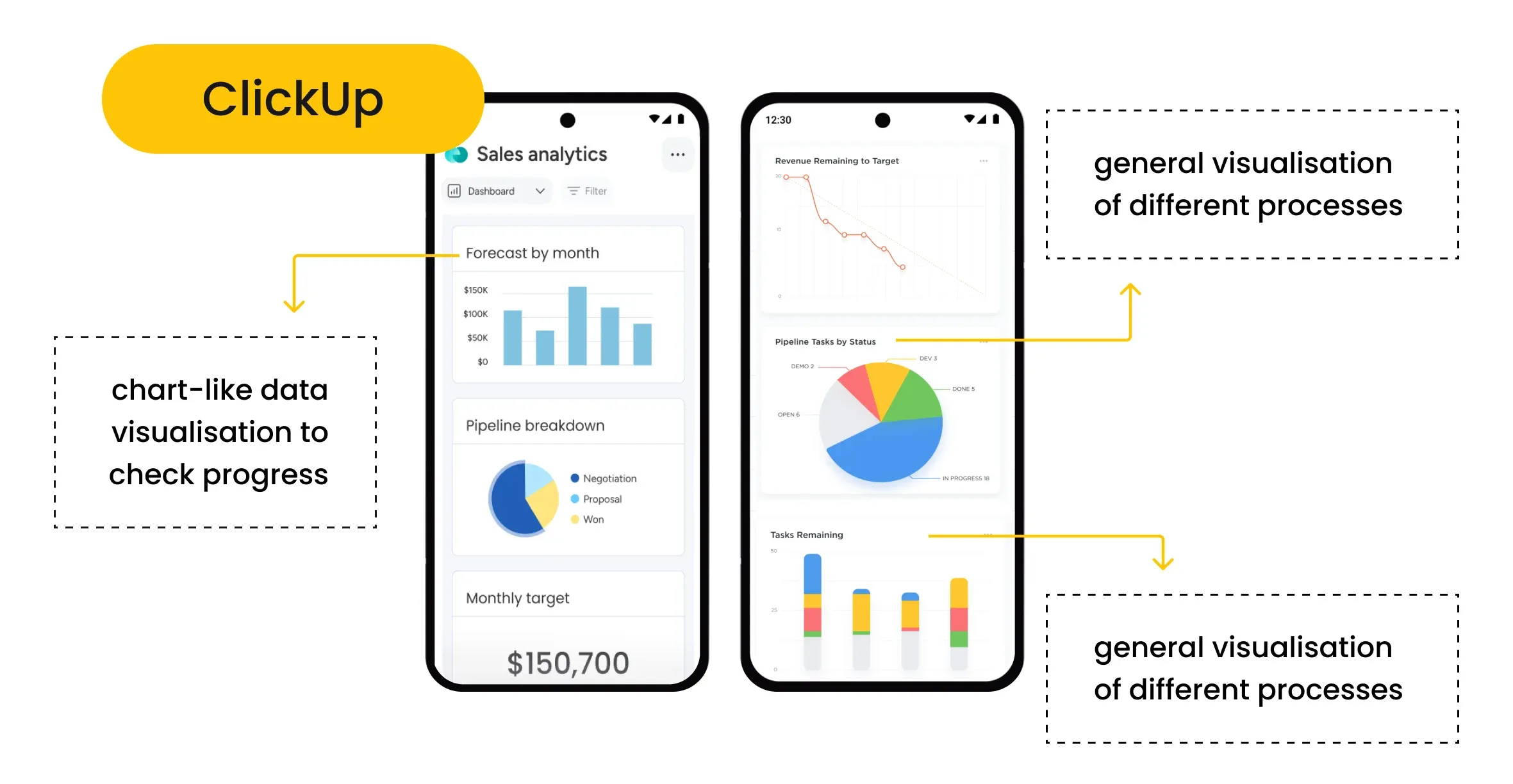
As the name says, analytical CRM is used for market research and analyzing customer data. This helps to make a more accurate and detailed customer profile, define customer behavior patterns, and better understand the needs and expectations of the target audience.
It highly depends on CRM data management. Yet, it is essential not only to store and share data effectively but to gather all needed information about the product clients.
3. Collaborative CRM Development
This CRM development scenario also highly depends on CRM data management. However, this type of customer relations management system aims at creating clear and proper communications.
One of the major advantages of such CRM systems is the fact, that they can be used to improve both internal and external communication. For illustration, it is used for team collaboration like fast data and file sharing, using built-in chats, discussing some issues, etc.
Additionally, such custom CRM can be used for customer services. For instance, you can integrate some ready-made solutions via APIs like conversational AI for customer support, or code them on your own. This allows automation of certain services like FAQ answering with the use of chatbots. As a result, you will save time and effort, which will play a significant role in the mid- and long-term.
Certainly, each of the foregoing customer relationship management system types also has its own crucial components of CRM. Hence, CRM application development will differ and require various skills and experience for each niche of CRM development.
Despite that chosen type of CRM software development is important, it is still not the only aspect to take into account, when you build your own CRM. Moreover, some basic CRM features are common for both custom CRM development and SaaS CRM systems.
General Components of CRM Systems
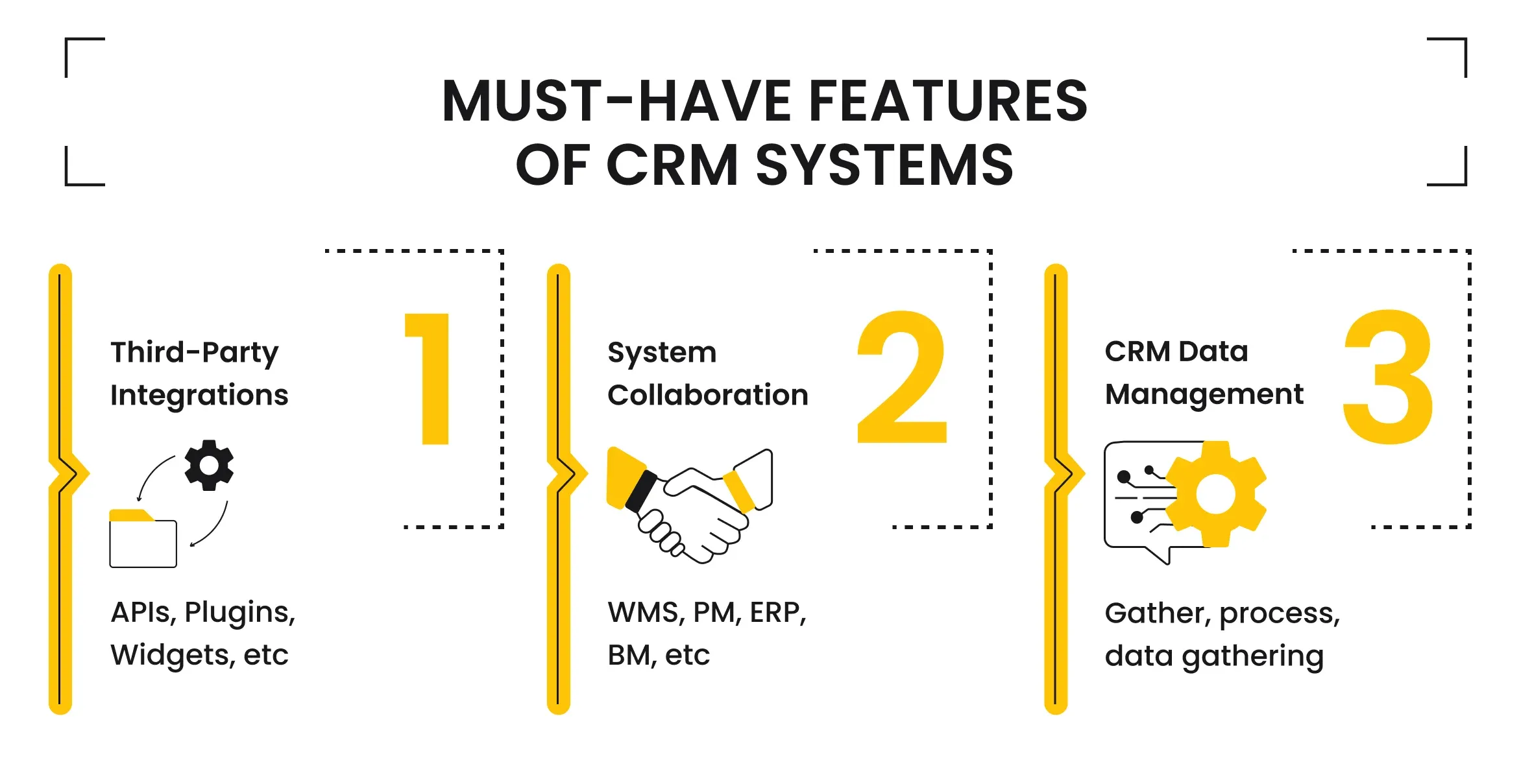
Each type of application has its MVP. A minimum viable product is the best starting point in any custom software development from scratch.
To make it simple, MVP is the most basic version of an app, which includes only the most essential features, required for the app to work and achieve its main goal.
The main benefits of choosing the MVP approach for custom CRM software development are:
- It has a much faster development cycle. Developing only virtual app functionality allows you to perform your CRM development much faster, compared to developing more advanced and scalable software.
- It is much cheaper. First of all, MVP is faster, so in terms of time and resource agreement, you will get a chance to save money by hiring dedicated software development team for less time. Additionally, it requires only general knowledge and coding experience and cuts the need for extra paid integrations or a more complicated tech stack.
- It is more flexible. If you choose MVP CRM development, you will get the basic app, which serves its purposes and has great potential for scaling in the future. First of all, you don’t need to maintain and test extra features, which allows you to prioritize the development of new functionality. Secondly, you can perform market research and define the most relevant and useful features at the moment. So, you can avoid CRM optimization, or building unneeded features.
MVP CRM software development requires performing the discovery phase of the project. It helps to define the most critical features. Fortunately, it is also possible to define general components of CRM systems, which are common for most types of this software.
Third-Party Integration Support
First of all, during your custom CRM software development, you have to ensure, that the final application will support third-party software. It includes numerous solutions and integration types like APIs, Plugins, Widgets, etc.
Such a possibility is relatively easy to develop, yet gives countless advantages and possibilities for customizable CRM. The most important advantage of such functionality is the ability to scale your software, avoiding the need to code features from scratch.
This is especially important when you build your own CRM minimum viable product intending to scale the functionality in the future. Thus, you can write just a few lines of code and enable ready-made features.
Collaboration with Other Software Applications
While third-party integrations provide you with premade features or similar components of CRM, support of other software apps is a more complex goal.
However, if you want to improve CRM data management, and use the whole potential of custom CRM, you have to ensure, that it can efficiently cooperate with other systems. For instance, it can be a warehouse management system, custom project management solutions, ERPs, or other systems for improved business operations management and automation.
So, setting up a collaboration environment with the rest systems gives businesses numerous benefits like fast data sharing, more accurate analysis, improved services, etc.
CRM Data Management and Gathering
Finally, when you build your own CRM, don’t forget, that its efficiency highly depends on the data.
Thus, apart from setting user-friendly environment, you have to ensure the quality of all data-related processes. It includes data gathering and processing, packaging and sharing, visualization, etc. The better and faster these processes are - the more efficient your custom CRM will be.
Apart from general CRM data management practices, you should also consider more niche and specific approaches to handling it.
For instance, one of the best data practices for customizable CRM is customer profiling and saving historical data. Thus, you will get a chance to better understand your clients’ behavior, needs, and demands. Additionally, it significantly improves customer support, providing your customer service department with more detailed insights about customers, informing about their potential ussies, improving client retention, and creating a more individual approach.
Finally, historical data can simplify the process of customer support automation by providing chatbots and other types of conversation AI for customer services with detailed reports and client portraits.
Custom CRM Software Development Essentials
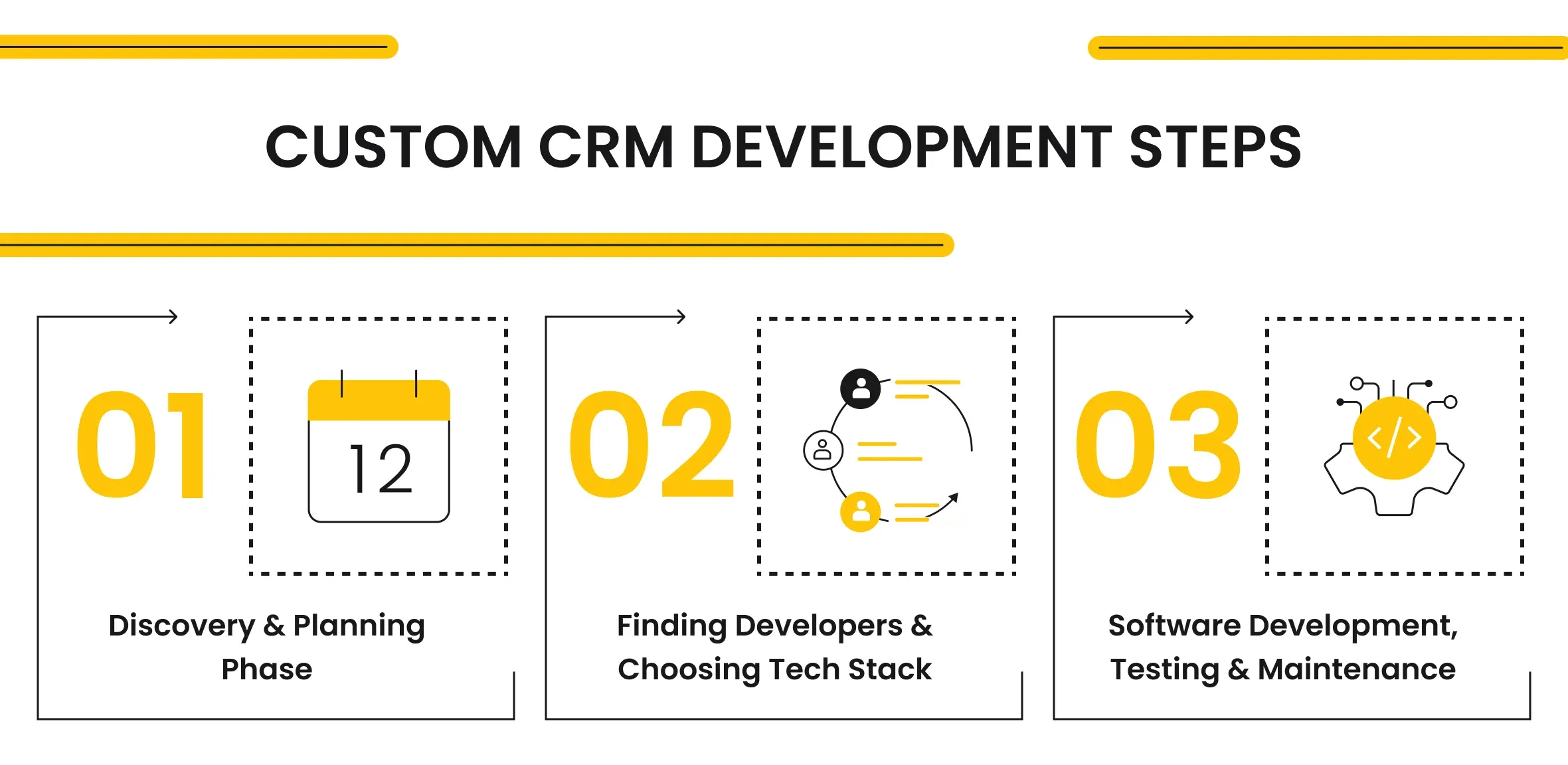
Eventually, let’s talk about your future custom CRM application development and how to build a CRM.
Just like with any other software development process that works, it is possible to distinguish a few major steps.
1. Discovery Phase of the Project
The first, and most important step is to plan your future customizable CRM.
At this stage, you will have to define your goals and reasons why you need custom CRM. You have to choose the most essential features, understand what business goals it must serve, and perform a rough estimation, to learn how much such CRM system development will cost.
Besides, you should compare SaaS solutions and custom CRM development. Maybe, integrating CRM software-as-a-service will be more beneficial for you at the moment. Also, you should plan approximate scalability of your project, if you plan to improve it and integrate new functionality.
Eventually, you have to think about the possibility of distributing your customizable CRM as SaaS in the future. If you have such plans, you should define this idea at the very beginning, to avoid a complex CRM optimization process. Knowing your future intentions helps to set up all needed code-base components of CRM in advance.
Such custom CRM development services will take more time, yet are worth it.
2. Hire CRM Software Developers
After you have defined the main aspects of CRM system development and estimated the time and price for such a software development project, you should find and hire CRM software developers.
Judging from our experience, IT outsourcing and hiring a remote software development team is a preferable approach in terms of CRM application development. For instance, outsourcing software development to Eastern Europe helps to significantly cut development expenses, still having niche-experienced developers on board.
Thus, if you hire CRM software developers in terms of IT outsourcing you can save money with no impact on the software quality.
3. Start Custom CRM Software Development
After finding and hiring CRM software developers, and preparing SRS documentation, you can start the CRM software development process.
At this stage, you should set up a communication strategy with your outsourced CRM software development company. Both sides should agree on the terms of communication and schedule meetings: whether they will work on a daily or weekly basis, will the whole team participate, or it will be a one-on-one call between project management and the client, etc.
Frankly, this stage is very flexible and can vary, depending on the needs and requirements of the customer.
For a better illustration of how to build a CRM in terms of IT outsourcing and what potential benefits it can bring, let’s examine one of your recent case studies.
Incora Custom CRM Development Services
There are two latest Incora projects, related to custom CRM software development:
- White-label software development and CRM optimization for the client
- Development of web-based custom CRM from scratch
Let’s briefly discuss each of them.
CRM Optimization on Demand
The first case is relatively easier. One of our clients had a customizable CRM, developed earlier. Yet, they noticed, that it lacks optimization and performance. Combined with the fact, that the company has no experience in software development, they decided to contact us for a rough estimation.
As a result, we made our calculations and offered our CRM optimization services.
The basic structure of custom CRM was fine, yet during code reviewing our niche-experienced developers spotted a few pitfalls, worth taking care of. So, in terms of our cooperation with the clients, we managed to:
- Optimize and partly rewrite code units
- Restructure and rebuild the IT architecture of the system
- Implement conversational AI for customer service
Writing clean code is a must-have aspect of software development. Fortunately, even if the code-basis is poorly written, it is still possible to recode it. The best way is to develop a fine product from the very beginning. Code rewriting takes extra time and resources, and is a challenging task.
So, it is better to count all pros and cons, before deciding on such projects. In this particular case, rewriting code units and making them clear was worth it. It significantly improved the overall performance and helped to avoid some potential mistakes in the future in terms of scaling software.
To do so, we also had to take part in rebuilding the IT architecture and infrastructure. One of the major reasons was to make a more efficient CRM data management and communication with databases.
Finally, in terms of the project, we implemented a chatbot for customer support. It helped to boost the performance and customer satisfaction. To make it simple, this AI module was trained to provide users with fast responses. It includes FAQs, predefined questions, informing users about recent updates, etc.
Hence, our clients managed to free resources and redirect them to other tasks. At the same time, it improved customer services and made them faster and more efficient.
CRM Application Development with Incora
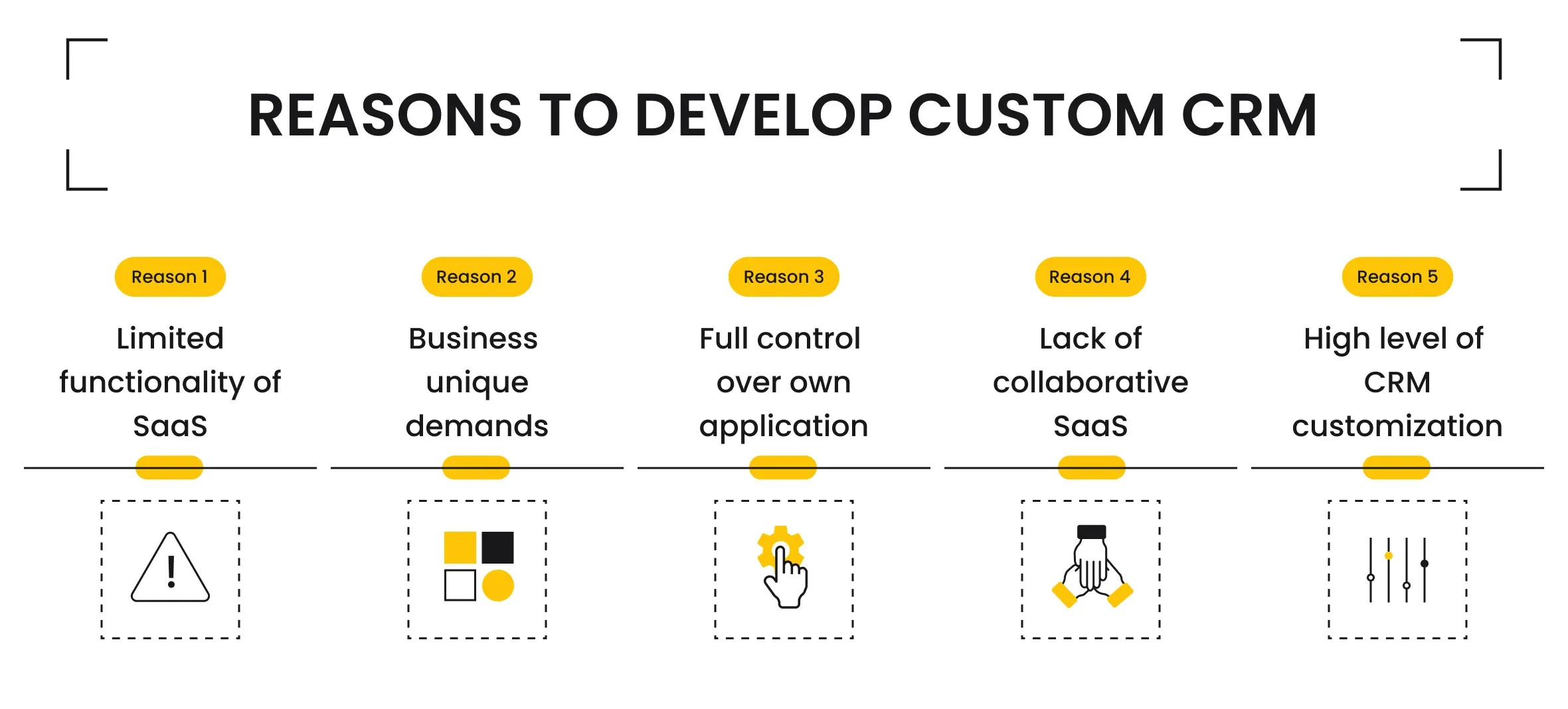
Custom CRM software development from scratch is a much more complex and challenging task. However, we found it more beneficial for the future.
While working with various ready-made CRM SaaS solutions like HubSpot, Monday.com, and others, we noticed some crucial issues.
Despite the overall usability and user-friendly nature of such CRM software development companies and services, they have drawbacks. For instance, many such third-party CRM systems are proposing great and unique features, which can significantly boost the productivity of business companies. Yet, these services are subscription-based and have limited customization. Thus, to use certain required features, you will pay for the rest functionality in a subscription package.
Additionally, many such services lack cooperation and collaboration methods with the rest systems. So, it can be challenging to establish data and information sharing between different CRMs.
Finally, these SaaS don’t cover all the needs and demands of business. Some data is not included, and services for certain departments don’t exist. For instance, HubSpot provides great CRM for the sales department, yet there are no satisfying options for project managers, financial dept., human resources, and marketing teams.
Alternatively, custom CRM application development covers all the foregoing drawbacks, making it possible to satisfy all requests of departments. Also, it is cheaper for large companies and in the long term.
Obviously, CRM software development from scratch takes more time and resources at first. However, it is a wise choice from a perspective and can take place while you are using a ready-made SaaS solution.
If you are interested in custom CRM development services, or looking for CRM optimization options, we encourage you to contact our representatives to discuss your needs and ideas. This will help define all the challenges and advantages of such software projects and make an informed decision, you won’t regret.
What’s your impression after reading this?
Love it!
1
Valuable
1
Exciting
1
Unsatisfied
1
FAQ
Let us address your doubts and clarify key points from the article for better understanding.
What is a CRM system?
A Customer Relationship Management (CRM) system is a software tool used by businesses to manage interactions with current and potential customers. It helps in organizing, automating, and synchronizing sales, marketing, customer service, and technical support processes.
Why should I consider developing a custom CRM system?
Off-the-shelf CRM systems might not always fulfill the unique requirements of your business. Developing a custom CRM system allows you to tailor features and functionalities according to your specific needs, ensuring better efficiency and alignment with your business processes.
What are the key benefits of a custom CRM system?
- Tailored Features: You can customize features and functionalities to match your business processes perfectly.
- Scalability: A custom CRM can grow with your business, accommodating new requirements and increasing data volumes.
- Integration: Seamless integration with existing systems and tools.
- Enhanced Security: You have control over security measures, ensuring compliance with industry standards and regulations.
- Improved User Adoption: Design the system with your team's workflows in mind, leading to higher user adoption rates.
What are the steps involved in developing a custom CRM system?
- Requirements Gathering: Understand your business needs and define the features and functionalities required.
- Design: Create a design blueprint outlining the system architecture, user interface, and data model.
- Development: Build the CRM system according to the design specifications, employing coding and programming techniques.
- Testing: Conduct thorough testing to identify and fix any bugs or issues.
- Deployment: Roll out the CRM system in a phased manner, ensuring minimal disruption to business operations.
- Maintenance and Support: Provide ongoing maintenance and support to address any issues and implement updates or enhancements.
How long does it take to develop a custom CRM system?
The development timeline varies based on factors such as the complexity of requirements, scope of features, team size, and technology stack. On average, it can take several months to develop a fully functional custom CRM system.
How much does it cost to develop a custom CRM system?
The cost of development depends on various factors such as the complexity of features, development time, hourly rates of developers, infrastructure requirements, and ongoing maintenance. It's essential to get a detailed quote from development agencies or consult with experienced developers to estimate the cost accurately.
Can I integrate third-party applications with my custom CRM system?
Yes, custom CRM systems can be designed to integrate seamlessly with third-party applications such as email marketing tools, accounting software, e-commerce platforms, and more. APIs and webhooks are commonly used for integrating external systems with the CRM.
YOU MAY ALSO LIKE
Let’s talk!
This site uses cookies to improve your user experience. Read our Privacy Policy
Accept
Share this article